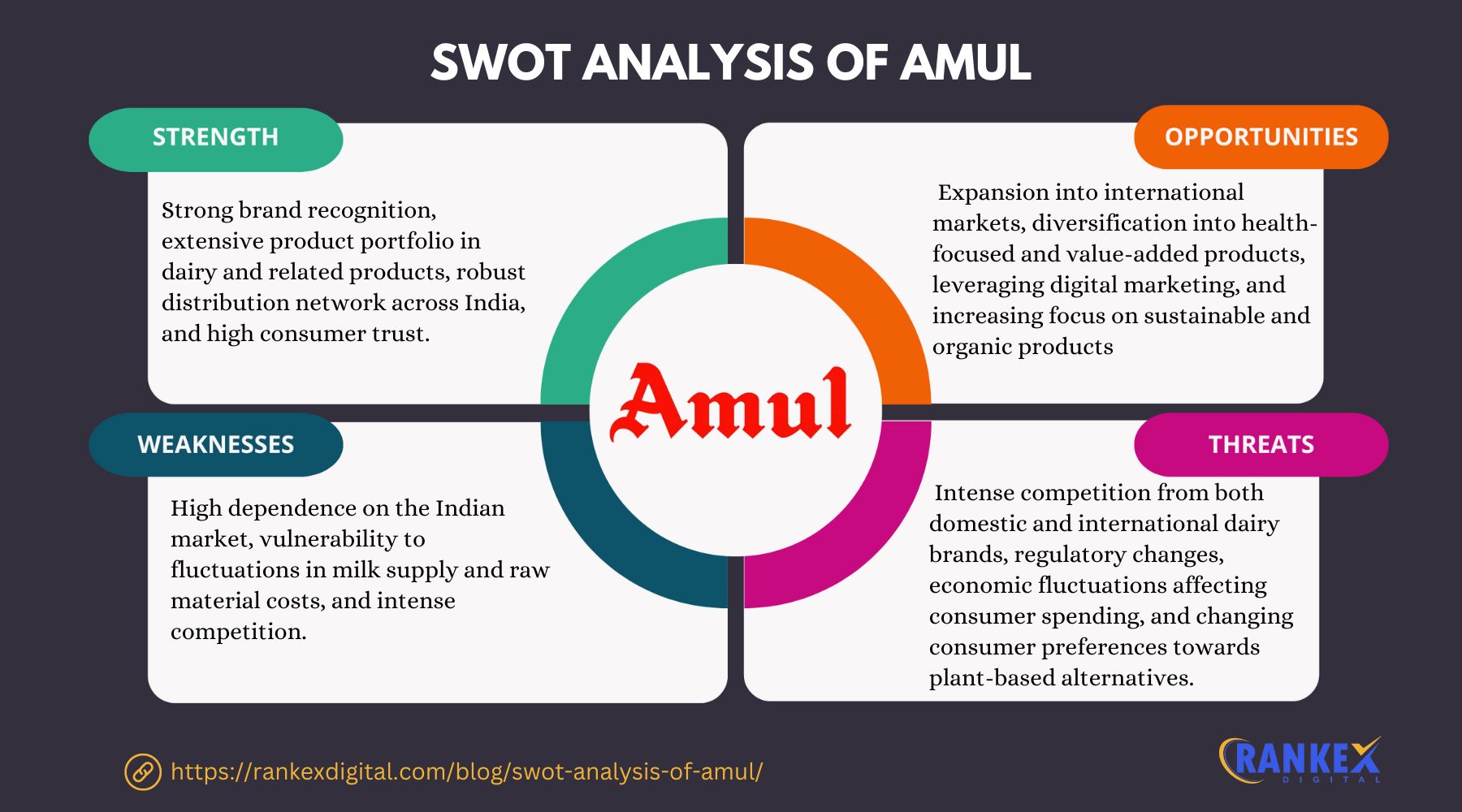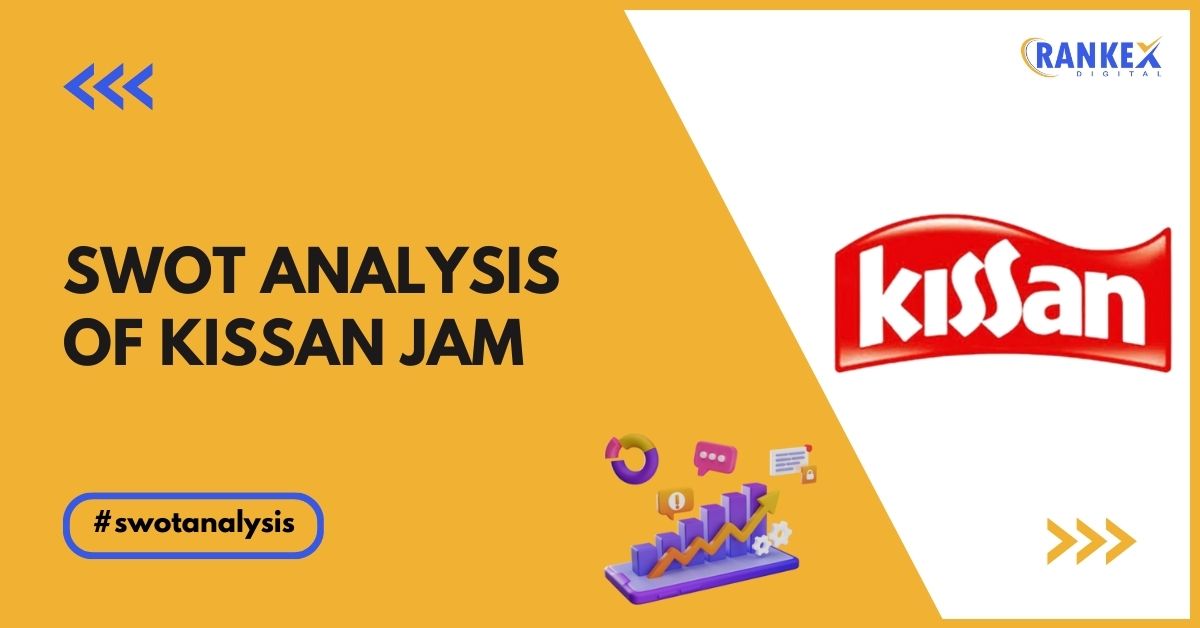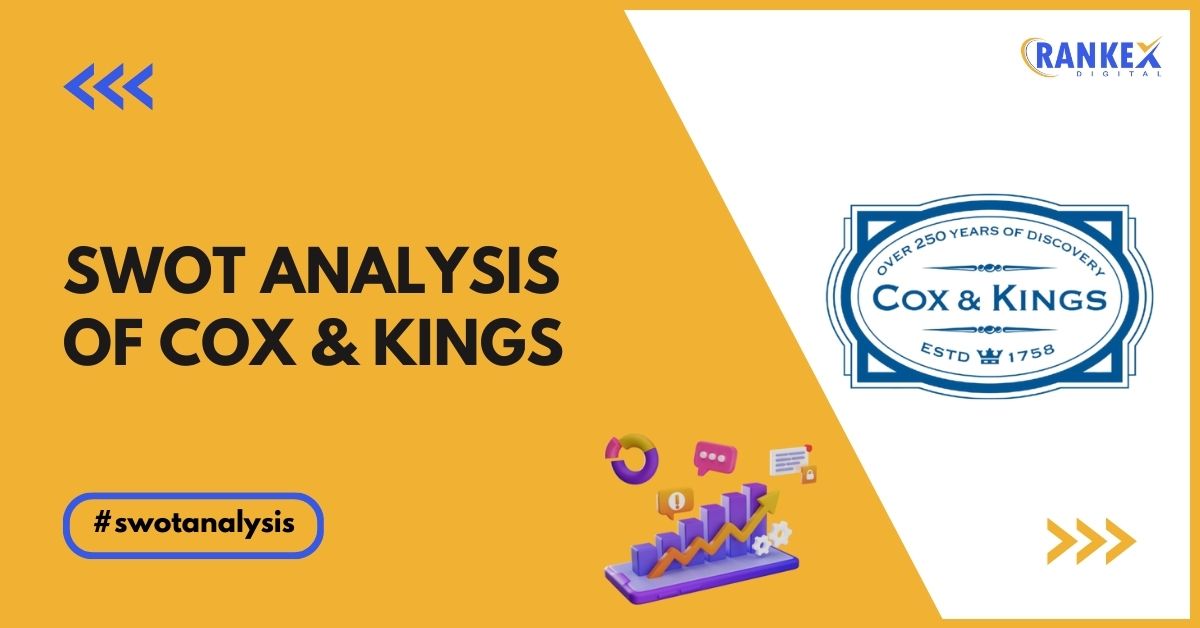Amul, India’s largest dairy cooperative, is a household name synonymous with dairy products. With its iconic “Utterly Butterly Delicious” slogan and a wide range of products, Amul has played a pivotal role in revolutionizing India’s dairy industry.
Understanding the strengths, weaknesses, opportunities, and threats (SWOT) of Amul is essential for evaluating its current market position and future growth potential. This article provides a comprehensive SWOT analysis of Amul, exploring its key attributes and competitive landscape.
In this blog
Overview of Amul

Amul was founded in 1946 as a response to the exploitation of marginal milk producers by traders and agents in small towns. It is managed by the Gujarat Cooperative Milk Marketing Federation Ltd. (GCMMF) and has become a leading dairy brand in India.
Headquartered in Anand, Gujarat, Amul offers a wide range of dairy products, including milk, butter, cheese, yogurt, and ice cream.
With a network of over 3.6 million milk producers, Amul has a significant presence in both urban and rural markets across India.
Quick Stats About Amul
| Founder | Tribhuvandas Patel (under the guidance of Sardar Vallabhbhai Patel) |
|---|---|
| Year Founded | 1946 |
| Origin | Anand, Gujarat, India |
| No. of Employees | 100,000+ |
| CEO | R.S. Sodhi |
| Company Type | Cooperative |
| Annual Revenue | $8 Billion |
| Net Profit | $500 Million |
Current News of Amul
- Expansion in Plant-Based Products: Amul has been diversifying its product range by introducing plant-based milk and dairy alternatives to cater to the growing demand for vegan products.
- Export Growth: Amul has been expanding its footprint in international markets, with a focus on exporting its dairy products to new regions, including the Middle East and Southeast Asia.
- Sustainability Initiatives: Amul has been actively involved in sustainability practices, such as water conservation and renewable energy adoption, to reduce its environmental impact.
- Innovation in Packaging: Amul is investing in innovative packaging solutions to improve product shelf life and reduce plastic waste.
SWOT Analysis of Amul

Strengths of Amul
- Strong Brand Equity:
Amul is one of India’s most iconic and trusted brands, with a rich history dating back to 1946. It has earned a reputation for delivering high-quality dairy products and has built a deep emotional connection with consumers across generations. The brand’s widespread recognition is further strengthened by its association with the cooperative movement, which ensures that its products are linked to the welfare of millions of Indian farmers. This strong brand equity allows Amul to stand out in the highly competitive dairy sector. - Extensive Supply Chain:
Amul operates on a cooperative model, which means it connects millions of farmers directly with consumers, cutting out middlemen. This system enables Amul to maintain a consistent supply of quality raw materials while providing fair prices to the farmers. The vast and efficient supply chain allows Amul to be present in over 50 countries and ensures that their products are available in even the remotest areas of India. - Diverse Product Portfolio:
Amul has a broad range of products, which include milk, butter, cheese, yoghurt, ice cream, chocolates, and beverages. This diversity allows Amul to cater to the varied tastes and preferences of consumers. The brand is not limited to one product category but has adapted to changing market demands and consumer needs over the years, which has helped it maintain its dominance in the dairy industry. - Affordable Pricing:
One of Amul’s standout strengths is its affordability. Despite offering premium quality products, Amul manages to keep its prices competitive, making it accessible to a wide range of customers. This has enabled it to capture a significant market share, particularly among middle-income households, who value value-for-money offerings. - Innovative Marketing:
Amul’s advertising is famous for its wit, humour, and timely response to current events, thanks to the iconic Amul girl. This approach has helped the brand stay relevant over the decades, while also fostering a sense of familiarity with its consumers. Amul’s advertising campaigns are not just promotional tools but have become a part of India’s cultural fabric, which adds to its brand recognition and consumer loyalty.
Weaknesses of Amul
- High Dependence on Dairy Products:
Amul has been able to build a stronghold in the dairy market, but its heavy reliance on dairy products as the primary revenue source limits its growth potential in other sectors. Despite some diversification, Amul’s core operations are closely tied to dairy, and any significant disruption in this sector (such as price fluctuations or changing consumer preferences) could impact the company’s overall performance. - Operational Challenges:
Amul’s cooperative model, while beneficial in many ways, also presents operational challenges. Coordinating between millions of small farmers, managing logistics, and ensuring consistent product quality across all its operations requires significant resources. Moreover, maintaining product consistency and quality across its massive distribution network can be difficult, especially when dealing with perishable items like milk and other dairy products. - Limited Presence in Non-Dairy Segments:
While Amul has a strong presence in the dairy sector, it has made limited inroads into non-dairy categories such as snacks, ready-to-eat meals, or beverages like tea and coffee. As consumer preferences shift towards plant-based and alternative products, Amul’s relatively narrow product range outside the dairy category could become a limiting factor in its long-term growth, especially as the demand for non-dairy options rises. - Price Sensitivity:
Though Amul’s pricing strategy makes its products accessible to a wide consumer base, the company faces challenges related to price sensitivity. As production costs rise (due to factors like labour costs, packaging, and raw material prices), maintaining affordable prices while also ensuring profitability becomes difficult. Any price hikes could lead to a shift in consumer behaviour, particularly among budget-conscious segments.
Opportunities for Amul
- Expansion into Non-Dairy Products:
There is an emerging market for plant-based products, such as almond milk, oat milk, vegan cheese, and dairy-free ice cream. Given its strong brand presence, Amul is well-positioned to leverage this demand and diversify its offerings. By introducing non-dairy alternatives, Amul can cater to a growing base of health-conscious and environmentally-aware consumers, while also tapping into the international market where demand for such products is rising. - International Market Expansion:
Amul has already established itself in international markets, particularly in regions with large Indian diaspora populations. However, there is significant room for expansion in other parts of the world. With the growing global demand for dairy products, Amul can further explore markets in the Middle East, Southeast Asia, Europe, and North America. With the right marketing strategy and product adaptation, Amul could build a stronger global presence. - Product Innovation:
Innovation is key to staying competitive in the food industry. Amul can continue to explore the development of fortified and functional foods, such as probiotic yogurts, lactose-free products, and dairy-based nutritional supplements. As health and wellness trends continue to influence consumer choices, there is a great opportunity for Amul to expand into these new product categories. - E-commerce Growth:
The shift toward online shopping presents an exciting opportunity for Amul to expand its reach. By strengthening its digital presence and partnering with e-commerce platforms, Amul can directly connect with consumers and tap into the growing demand for online grocery shopping. Direct-to-consumer models could also provide the company with valuable data to understand consumer preferences and tailor its offerings accordingly. - Sustainable Practices:
With an increasing global focus on environmental sustainability, Amul can further enhance its commitment to sustainable practices. This can include adopting eco-friendly packaging, improving the efficiency of dairy farming practices, and reducing carbon emissions. Such initiatives would resonate with environmentally-conscious consumers and bolster Amul’s reputation as a socially responsible brand.
Threats to Amul
- Intense Competition:
The dairy industry is highly competitive, with many established brands like Mother Dairy, Britannia, and local players across India. Amul faces continuous pressure to maintain its market leadership, and new entrants in the market, particularly those offering organic or niche products, could pose a significant challenge. - Fluctuating Milk Prices:
Milk procurement prices fluctuate due to various factors, including climate conditions, feed prices, and government policies. Such price variability can affect Amul’s profit margins and pricing strategies, particularly when milk prices rise, putting pressure on the brand’s ability to maintain affordable pricing for its customers. - Regulatory Changes:
Amul is subject to government regulations and policies, particularly those relating to food safety, hygiene, and import/export regulations. Changes in these policies, such as stricter food safety laws or sudden tariff increases on imported raw materials, could disrupt Amul’s operations or lead to higher costs. - Health Trends:
Increasing awareness of the potential health risks associated with high dairy consumption, such as lactose intolerance, obesity, and cardiovascular diseases, could drive consumers toward plant-based and vegan alternatives. Amul’s reliance on traditional dairy products may limit its ability to capture the growing segment of health-conscious consumers who prefer plant-based diets. - Supply Chain Disruptions:
Amul’s extensive supply chain, while a strength, also exposes the company to risks. Natural disasters, pandemics, or geopolitical tensions could lead to disruptions in the supply chain. Any interruption in the availability of raw materials or transportation could severely impact Amul’s production and distribution, leading to product shortages or delays.
Top Competitors of Amul
- Mother Dairy: A major competitor in the dairy industry, particularly in the Delhi-NCR region.
- Nestlé: A global player with a strong presence in the dairy and nutrition segments.
- Parag Milk Foods: Known for its brand ‘Gowardhan,’ it competes with Amul in the premium dairy segment.
- Britannia: Competes with Amul in dairy products, particularly in butter, cheese, and dairy-based snacks.
- Danone: An international competitor with a focus on health-oriented dairy products.
Conclusion
The SWOT analysis of Amul highlights its strong brand equity, extensive supply chain, diverse product portfolio, and affordable pricing as key strengths. However, the cooperative faces challenges such as high dependence on dairy products, operational complexities, and intense competition.
Opportunities for Amul lie in expanding into non-dairy products, international markets, product innovation, e-commerce, and sustainable practices. On the other hand, threats include fluctuating milk prices, regulatory changes, health trends, and supply chain disruptions.
By leveraging its strengths and opportunities and addressing its weaknesses and threats, Amul can continue to thrive as a leader in the dairy industry and beyond.
Frequently Asked Questions
1. What is Amul known for?
Amul is best known for its high-quality dairy products, including milk, butter, cheese, ice cream, yogurt, and chocolates. It is one of India’s most trusted and iconic dairy brands, with a strong legacy dating back to 1946.
2. How does Amul ensure the quality of its products?
Amul maintains stringent quality control measures throughout its production process. The company sources milk directly from millions of dairy farmers through its cooperative model, ensuring a fresh and reliable supply of quality milk. Amul also follows rigorous testing and standards for product safety and quality in its manufacturing facilities.
3. What is the Amul cooperative model?
The Amul cooperative model connects millions of dairy farmers directly with the market, bypassing middlemen. This ensures that farmers receive fair prices for their milk while giving consumers access to fresh and affordable dairy products. The cooperative system helps Amul maintain a steady supply of high-quality milk at competitive prices.
4. Where can I buy Amul products?
Amul products are widely available across India and in over 50 countries. They can be purchased from retail stores, supermarkets, and online grocery platforms. Additionally, Amul has its own branded stores called Amul Parlors, where a wide range of their dairy products is available.
5. Is Amul expanding into non-dairy products?
Yes, Amul is exploring opportunities in non-dairy products. While its primary focus remains on dairy, the brand has started to expand into plant-based dairy alternatives, such as soy milk and vegan products, to cater to the growing demand for non-dairy options.
6. How does Amul contribute to the welfare of farmers?
Amul’s cooperative model directly benefits farmers by providing them with fair prices for their milk, which is a significant source of income for many rural households. The cooperative also helps farmers by offering them technical support and training on better dairy farming practices.
7. Can Amul’s products be found outside of India?
Yes, Amul products are available in several international markets, especially in regions with large Indian diaspora communities, such as the Middle East, Southeast Asia, the United States, Canada, and the UK. The brand has seen strong demand for its products globally, especially its butter, cheese, and milk powders.
8. What are some of Amul’s most popular products?
Some of Amul’s most popular products include Amul Butter, Amul Cheese, Amul Milk, Amul Ice Cream, Amul Ghee, and Amul Chocolate. These products are staples in many households and are loved for their consistent quality and taste.











